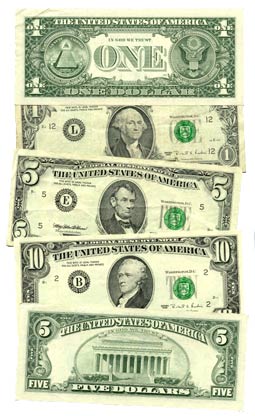- Up at 5 two days in a row. Sleepy. #
- May your…year be filled w/ magic and dreams and good madness. I hope you…kiss someone who thinks you’re wonderful. @neilhimself #
- Woo! First all-cash grocery trip ever. Felt neat. #
- I accidentally took a 3 hour nap yesterday, so I had a hard time sleeping. 5am is difficult. #
- Wee! Got included in the Carnival of Personal Finance, again. http://su.pr/2AKnDB #
- Son’s wrestling season starts in two days. My next 3 months just got hectic. #
- RT @Moneymonk: A real emergency is something that threatens your survival, not just your desire to be comfortable -David Bach # [Read more…] about Twitter Weekly Updates for 2010-01-09
Things You Should Buy Online to Save Money
Article written by money supermarket.
Sometimes the price you pay in-store for a product or service can change dramatically if you find the same product online, and in most cases the price in-store can be considerably higher. There’s nothing worse than getting home from a shopping trip thinking you have a bargain, until you realise that you could have saved a lot more had you have waited until you got home. Here are a few examples of things you should buy online to save money:
- DVD’s and Blu Rays
All movies, whether on DVD or Blu Ray format, are generally cheaper if bought online, it’s a fact that I have learned over the years. I’ve always found that searching the sites of film selling giants Amazon and Play, I can always find a movie that little bit cheaper and some considerably so. There are also some websites such as dvdpricesearch that compare prices of all of the big merchants for you; it’s a great way to save time and money.
- Flights and Holidays
In my opinion, the day of buying flights face to face is slowly on the decline, I seem to find considerably cheaper prices by searching online at home. I think the main reason for this is that, travel or holiday agents just do what we do, they search online for the best prices, and unless they have any exclusive deals then they will just be getting the same prices as us. I tend to use some online travel comparison websites that again do the searching for you; however, some work better than others so make sure you do your research.
- Books
I always purchase books online, whether in the standard physical format or in the form of an e-book. Books are just one of those things that always seem to be cheaper, with the likes of Amazon and Borders available online and offering fantastic discounts. There are also many websites that sell niche or rare books online that can be considerably cheaper than going direct to a book seller.
- Auto Insurance
Auto insurance is one of those things that we all hate purchasing, but if you want to drive your vehicle on the road, then by law we have to spend our hard earned cash on it. Getting your auto insurance online can save you a lot of money. Using price comparison sites, you only have to fill in one form as if you’re applying for one quote, you will then be provided with a list of pricing options available to you.
- Cell Phones
Whether you are just buying a handset or if you’re looking for a monthly cell phone price plan, I always seem to find better deals online than I can in-store. Of course in-store you have the ability to try and haggle but I’ve found that the deals I get offered are never as good as those that I can find online. Online you can also search by provider website which is another great way to save money, and it would take you a lot of time to visit each store!
Jason’s note: I shop online a lot. I buy things that most people don’t realize are available online. An interesting counterpoint question: What should you buy in-person to save money?
Avoiding Financial Traps & Saving Money on Big-Ticket Purchases
This is a guest post written by Jason Larkins. He writes at WorkSaveLive – a blog he started to help people change the way they think about their finances, careers, and lives.
Who doesn’t like to buy stuff?
Okay…I’m sure there are a few of you out there that take pride in never buying a new “toy,” but I know personally that I LOVE stuff!
Not to the point that I make dumb financial decisions that jeopardizes my family’s financial well-being, but I do have that natural American desire to have nice things and to be able to do fun stuff!
If you’re in the market to buy a Big-Ticket item (i.e. a new car, TV, or other technology gadget), what are some of the things you should be thinking through as you contemplate making the purchase?
The first mistake people make is buying on impulse. The massive majority of Americans don’t even have a thought process when it comes to buying toys, so that’s why I decided to dedicate a post on a few things you should ponder.
3 Financial Traps You Should Avoid
1. Avoid spending extra for add-ons, or features, that you’re never going to use.
It is easy to get an appliance or technology gadget that has a ton of amazing features on it – but why pay for them if you won’t use them?
Consider buying the item that may be a step below what you’re looking at.
I know that I personally love the thought of having an Ipad 2, but am I really going to utilize it to it’s full capabilities?
Probably not!
It doesn’t mean I shouldn’t have one, but it does mean I can look at the older Ipad and save some money. Or, I can avoid the purchase altogether if I don’t think it’s going to be worth the money.
2. Be cautious with offers such as “no money down,” “90 days same as cash,” or “12 months interest free.”
Nearly 88% of the “90 days same as cash” offers are actually converted to payments because the purchaser couldn’t pay off the bill before the offer was up.
3. Don’t buy it just because it’s the cheapest.
Always be sure to do research prior to your purchase – check consumer reviews and product reviews. Saving money may not be worth it if the product breaks down quickly or doesn’t have the functionality that you’re looking for.
3 Strategies to Save Money
1. Prepare for large purchases and pay cash for them.
If you can’t pay cash for the item, then there is a good chance that you can’t afford it.
Determine how much money you will need to spend on a particular item and save up for it! This is going to help you in a couple of ways:
- It will help you avoid buying on impulse.
- If it takes awhile to save up for the item, then this will give you valuable time to really determine if it’s something you WANT badly enough to pay that kind of cash for it.
- It will allow you to ask for a DEAL. Every retailer pays a fee to run a debit/credit card. If you’re paying in cash the worst you can do is to ask for that 2-3% discount the store would be saving!
2. Buy at the end of the month, or at the end of the year!
Consumers rarely think of this, but it’s important for you to know that every store (and store manager) has monthly/yearly sales to report.
If they’re wanting to close out the month/year strong, they’re much more inclined to offer you a deal on whatever you’re buying!
3. Avoid the extended warranty!
Insurance (in general terms) is the act of transferring risk – the more people that pool money together to help mitigate risk (buy insurance), then the lower the cost of the insurance becomes.
The reason to avoid the extended warranties is because the cost you’re paying to cover your item also includes: commissions paid to the retail store, overhead for the insurance company (wages for employees, building costs, utilities, etc), and some profit for the insurance company as well.
Sure, you may be in the miniscule percentage of buyers that has their item break down on them, but the reality is that it’s unlikely.
If it was likely for your item to break down, then the insurance wouldn’t be available because it wouldn’t be a profitable endeavor for the insurance company (and they’d be out of business).
Whenever you’re buying something that has a large price tag, you should develop a process that you think through before buying it!
Always pay in cash, get a deal, and make sure you actually need everything you’re paying for.
Credit Card Pitfalls You Have To Avoid
The idea of a credit card is appealing. You don’t have to have the money to pay for things; you can just use the card. It creates instant gratification and you start to get used to the idea of getting what you want when you want it. Unfortunately, this can be a disaster waiting to happen.
If you get in over your head and begin to negatively affect your credit rating, it is not the end of the world. By looking at things like bad credit credit cards at Money Supermarket you can start to make things right again. Watch out for these pitfalls that could cause you to stumble into a bad credit card situation.
Enticing Rewards
You see the commercial or advertisement online and reward credit cards make it seem like you will be drowning in points that can be redeemed for airline miles or gift cards. Initially, you may think that this is a great reason to sign up for a card. Then, you begin to use the card often in order to earn points.
The problem comes when you start spending just to get the rewards and you can’t or don’t make payments to return to a zero balance every month. You may end up with a hefty annual fee on top of everything else. Don’t let the temptation of getting a reward create a problem with your credit score.
Maxing Out the Credit Card
When someone hands you $5,000, you will be tempted to spend it. Why not enjoy the new money? The problem is that a $5,000 credit card balance needs to be paid back. Don’t fall into the trap of spending the entire line of credit immediately.
If you do run into some financial difficulty or you really need a credit card for something, you will have nothing left to use. If you go over the limit, you can be sure that there will be some fees that come along with it. Use it wisely. Charge something and pay it off.
Skipping a Payment or Paying Late
Once you have a credit card, everything is going to affect your credit score. If you miss a payment or pay late, you can be sure that this is going to show up against you. Aside from the damage to your credit score, most credit cards come with a substantial penalty in the form of a late fee that gets tacked onto the next payment.
Always pay on time. Pay in early if possible. Keeping up to date with your credit card will show up positively on your credit rating.
When Problems Arise
Even if you do your best to avoid these pitfalls, sometimes financial problems can be unavoidable. An unexpected emergency requires you to max out the card. You run into a problem at work and lose your main source of income.
If you see that your credit is starting to decline, it is always possible to build that score back up. Start over using bad credit credit cards to make a positive impact on your credit score. With this scenario, you get an opportunity to once again avoid these pitfalls and improve your credit.
Saturday Roundup
First, the shameless self-promotion:
If you want to see the glorious wisdom that is my Twitter feed, follow me on Twitter. I’m @LiveRealNow.
Please take a moment to subscribe to Live Real, Now by email. You get a choice between having all of the posts delivered to your inbox, or just occasional updates and deals. Both options get my Budget Lessons, free of charge, including exclusive access to articles that are not published anywhere else. Woo!
If you prefer to get all of you information and interaction on Facebook, become a fan!
And of course, there is always the wonderful RSS subscription.
Next, for the part you’re here for…
The Cute War.
Budgeting In the Fun Stuff guest-posted here a few days ago. The post was about her dog. Nicole asserted that her kittens were cuter than BFS’s pug. There is some personal risk involved for me, but my pets are cuter. The proof:
The Best Posts of the Week:
Frugal Dad discusses What to Do When Your Beneficiaries are Minors. We settled this by not making our minor children the beneficiaries. If we both leap off the mortal coil at once, my Dad gets the money. I trust him to take care of my kids with it. No, Dad, you can not work on my brakes.
Marko found a fascinating photo series of WWII war photos overlaying modern pictures of the same location. It’s kind of creepy in places.
My favorite dinosaur has a child has been reclassified as a child itself, not an actual dinosaur. That makes youthful me very sad.
Finally, a list of the carnivals I’ve participated in:
Both the Carnival of Personal Finance and the Yakezie Carnival included Selling Your Home: For Sale by Owner.
The Festival of Frugality has It’s Better to Buy a House than Rent.
If I missed a carnival, please let me know.
3 Things Everyone Should Do Before the End of 2010

- Image via Wikipedia
New Year’s resolutions are great, but what are you doing the rest of the year? As we roll into summer and we see the year’s halfway point approaching, it’s important to look at our goals and our progress and see if we’re on track for where we want to be in our lives.
Financially, now is the time to start preparing for the new year. Don’t be like most people and wait until December to think about it.
Here’s a place to start:
- Max out your 401(k). If you are under 50 years old, your maximum annual contribution is $16,500. If you haven’t contributed to your 401(k), yet, this means you will have to deposit $2358 per month to max it out. If you would have started at the beginning of the year it would only be $1375 per month. If those numbers are out of reach, at least contribute enough to get your employer’s match. If your company matches 50% of your contribution up to 5%, you need to be contributing 5%. If your gross paycheck is $1000, you should contribute $50. If you do so, your company will be giving you $25. That’s free money and a 2.5% raise! With a pre-tax contribution, you are also lowering your taxable wage, so the 5% contribution is not lowering your take-home pay by 5%. In some cases, it may even raise your take-home pay!
- Know your money. Take some time to examine your income and your expenses. What are you having withheld? Will that leave you with a large tax bill next spring? Will it give you a huge tax refund, which is just an interest-free loan to the government? You withholding goal should be to pay nothing and receive nothing when you file your taxes in the spring. The less you withhold, the more you have for your daily expenses, but, if you withhold too much, you risk an unaffordable tax bill and possible penalties later. Look also at your expenses. Have you used your gym membership in the last few months? Cancel it. Do you know every cent you have to pay each month? Figure it out so you can plan the rest of your financial year. A budget is helpful here.
- Own your debt. “It’s not my fault.” “My ex stole my bank account.” “My dog ate the bill.” “My kidneys were stolen and I woke up in a bathtub full of ice and an invoice for services rendered.” “I lost my job.” “I have an X-Box addiction.” “I gave my credit card to a stripper, but we broke up. Go after the stripper.” Excuses. Here’s the thing: None of it matters. You owe the debt. Your choices are to pay the debt or file bankruptcy. Either way, you need to own the debt and take responsibility for whatever choices you made or debt you’ve accumulated. Denial is not a successful coping mechanism. Whatever you choose to do, know that it is your choice. You can’t hide from your bills or your $15/day “Venti Soy Hazelnut Vanilla Cinnamon White Mocha with extra White Mocha and caramel” habit.
[ad name=”inlineleft”]
What are your financial plans for the rest of the year?
Update: This post has been included in the Festival of Frugality.





